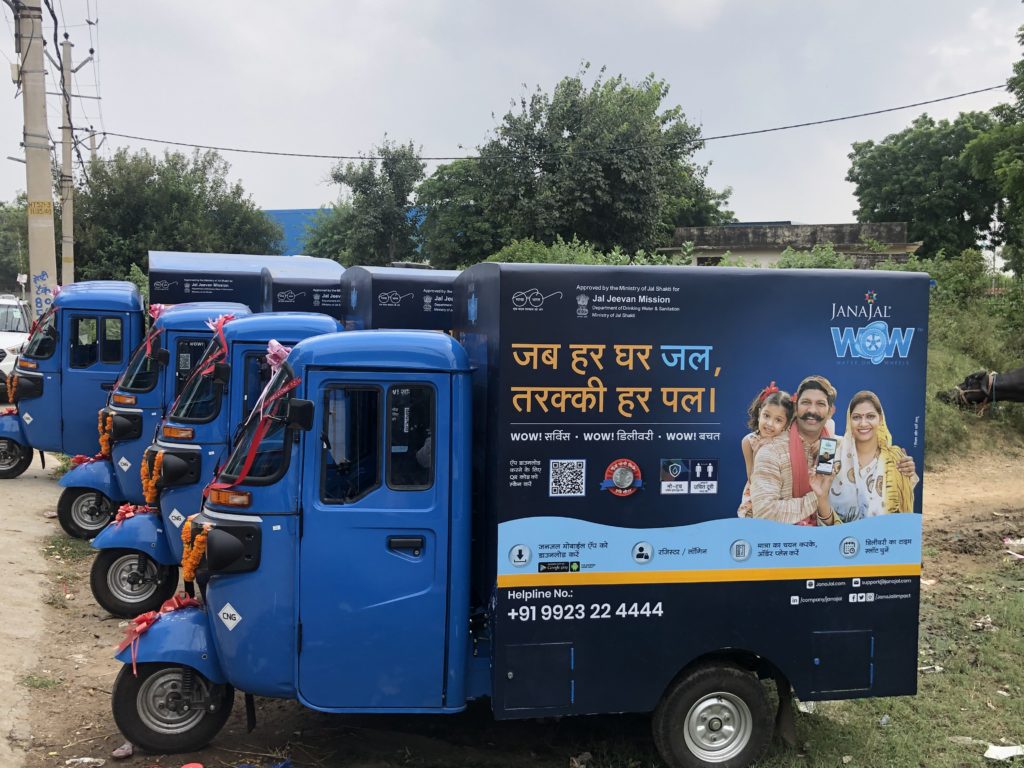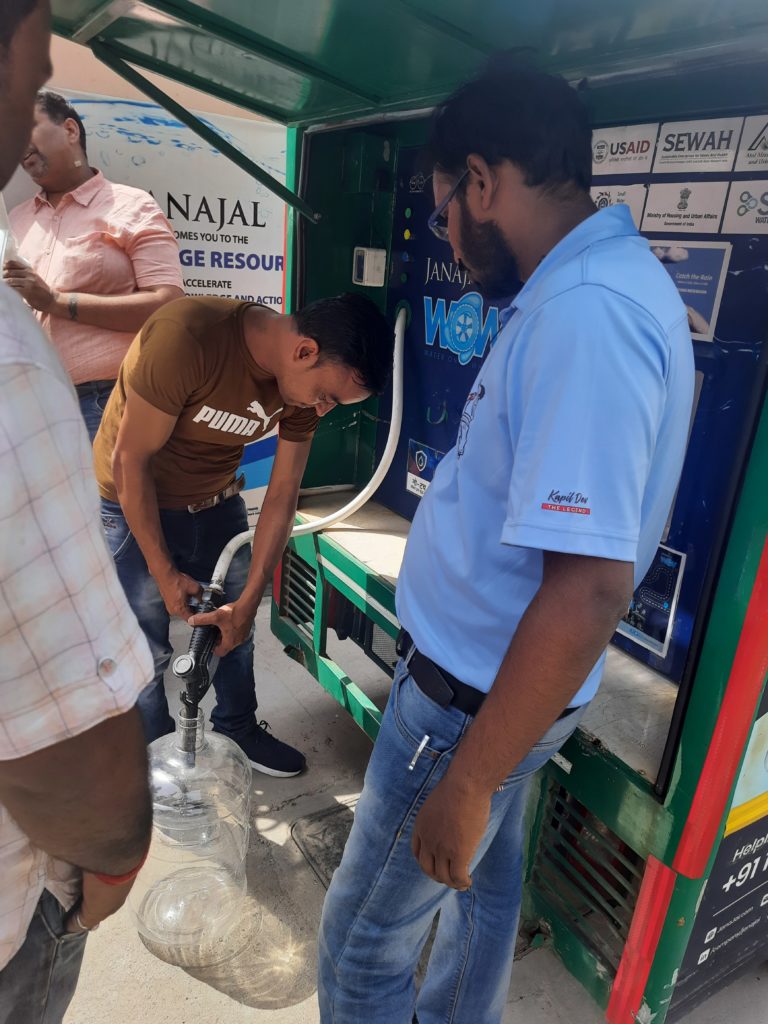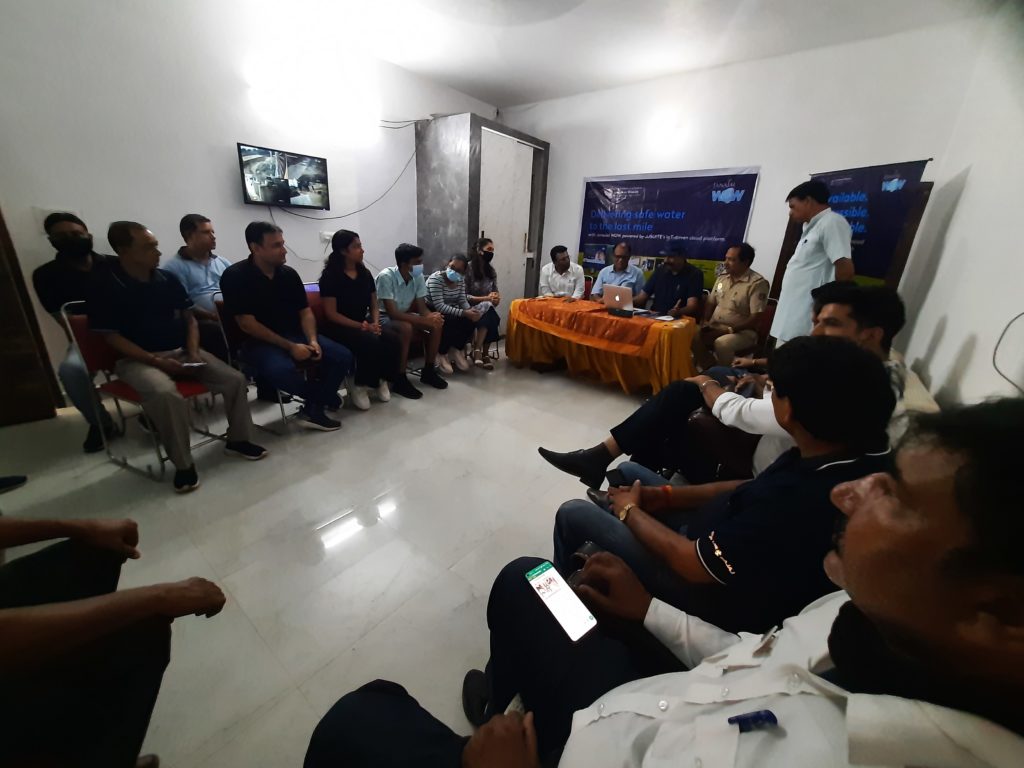JanaJal is a brand by Supremus Developers, delivering safe drinking water using technology-based solutions in India. Their products include water ATMs, on-site filtration units, and the recently developed water-on-wheels (WOWs) service. WOWs are mobile water dispensers, fitted to modified autorickshaws that deliver mobile water ATM services.
In the city of Delhi, there are 800 listed unauthorised slums, home to some 1.8 million people that do not qualify for a secured, piped water connection. Despite the demand for a reliable water source and the willingness to pay for safe water, slum dwellers have to buy water from unreliable sources like private water tankers that lack quality assurance and are unable to reach many areas. These sources are often considerably more expensive, and considerably less safe, than the water provided by the utility.
Following successful prototyping of the WOW service, the GSMA is supporting JanaJal to trial and launch their product in three to five slums in Delhi – these areas will be served by 25 WOWs. Each JanaJal WOW is an IoT-enabled three-wheeler that operates on Compressed Natural Gas (CNG) and can distribute approximately 3,000 litres of water per day. WOWs offer real-time monitoring of water quality, customer orders and volume of water dispensed. Customers can also purchase water using various digital wallets/interfaces.
We caught up with Dr Parag Agarwal and Anurag Agarwal, JanaJal co-founders, to discuss their expectations for how their solution will evolve in the next few years.
What demand does your service cater to?
JanaJal is a pioneer in safe drinking water services in India and operates multiple static water ATMs and IoT-based mobile water delivery vehicles across Delhi, Ghaziabad, Surat, Maharashtra, and other densely populated areas.
Our unique selling proposition is the development of an indigenous solution called the JanaJal water-on-wheels (WOW), a custom-built vehicle for the last mile delivery of safe water to the doorstep of households. We are using the WOWs to create a ‘hub-and-spoke’ model for water deliveries deep inside communities. During the 2019 India Water Week, the JanaJal WOW was recognised as a key innovation by the Jal Shakti Ministry (Integrated Water Resource Ministry) and is already playing a critical role in ‘Har Ghar Jal’- the Government of India’s mission of making safe water available to every household by 2024.
Our in-house cloud-based tech platform, ‘JJ SUITE’, helps us with real-time monitoring of quantity and quality of water being collected from water treatment plants and delivered through our WOWs. This platform enables absolutely transparency and optimum up-time to ensure our customers, who are mainly daily wages earners and low-income groups, continue to get an uninterrupted supply of clean, affordable drinking water.
At JanaJal, we pride ourselves in bringing emerging technologies, together with their applications, to actualisation. Every water ATM and JanaJal WOW is installed with custom built IoT devices and sensors that are designed to suit the specific environment it operates in. This also enables consumers to pay using the JanaJal Mobile App, allowing for seamless digital transactions using all forms of digital payment platforms, including 122 e-wallets in India. We are the first social enterprise in India to implement 100 per cent digital payments on all water ATMs through prepaid cards, QR codes and third-party payment gateways. Customers are updated regularly via notifications and can also access the 24/7 JanaJal Support Centre for assistance.
Our mobile app also enables access to real-time qualitative (total dissolved solids (TDS) level, temperature and pH) and quantitative (litres of water dispensed per day and revenue collection) data through IoT-based controllers connected to secure cloud servers. The IoT controllers are globally unique as we own the IP.
Through our services-focused optimised approach, JanaJal has dispensed over 110 million litres of safe drinking water, touching the lives of approximately 15 million people.
What are the challenges you expect to encounter in deploying the solution and with digital adoption?
JanaJal WOW offers a new solution of delivering clean and affordable drinking water to households deemed inaccessible. Introducing a digital solution to low-income households is the main challenge we currently face. We hope to educate the consumers on mobile usage to increase adoption of the app and enable them to find the WOW schedule and make payments.
At the same time, we also need to explain the importance of drinking clean water, hopefully differentiating us from competitors, as through the app, we will introduce a feature to check our water quality. This is quite a challenge as it requires a change in consumers’ behaviour. However, we are raising awareness by doing roadshows and through face-to-face interactions. Our drivers and operators are trained to engage with potential customers on the benefits of our services. We aim to further introduce exclusive benefits on the mobile app and prepaid cards, to encourage adoption and push a game-changing digital utility service that ultimately improves the quality of life.
What are you expecting to learn through the GSMA project?
The support from the GSMA has enabled us to penetrate densely populated sections of Delhi which would have otherwise been a challenge in terms of undergoing the compliance process to set up static water ATMs. Having recently extended our coverage zones, the support will also allow us to lessen the impact COVID -19 has had on the overall health and socio-economic aspect of residents.
One of the early successes we have seen across various locations is the uptake by women. Our interaction with female consumers has grown significantly in the last quarter since women are the biggest beneficiaries of our water delivery. Women are usually tasked to source clean drinking water, and through JanaJal WOW, they are now saving an average of one to two hours daily that would have been spent queueing for water. We also have floating offers to incentivise women, encouraging them to register and get the prepaid cards, thus increasing their adoption. Their reluctance to use the delivery service is gradually fading away as they realise JanaJal WOW is a reliable and economic source of clean water which they can count on day after day.
How do you see your business model evolving?
JanaJal WOW’s current business model primarily revolves around providing access to clean water for the underserved population in and around Delhi, in partnership with various government authorities such as Delhi Jal Board and the New Delhi Municipal Corporation. We also work under public-private partnership models with organisations like Konkan Railways.
Overall, our revenue is generated primarily through the sale of drinking water at a highly competitive rate of Rs.1/- (less than one cent) per litre, which is below the prevailing rates in the informal market. We also distribute prepaid RFID cards which enable households to seamlessly pay for water and help them maintain transparent logs of each of their transactions, increasing accountability.
We intend to expand our revenue streams through two channels:
- JanaJal WOW has tremendous marketing value since the three-wheelers acts as mobile advertising spaces. Each JanaJal WOW has the potential of becoming self-sustainable through long-term marketing and advertising contracts.
- Our prepaid RFID cards open the door to subscription models, allowing customers to collect water not only from JanaJal WOW but also from any fixed JanaJal Water ATM. The customers are given prepaid cards, at a small cost, and charged a one-time subscription fee. The users can then recharge their cards by either using the JanaJal App or instructing the JanaJal WOW drivers or helpline officers to top up their balance.
What partnerships have you formed, and what partnerships do you hope to form in the near future?
JanaJal has had on-going discussions with multiple local agencies. We recently signed an agreement with the Ministry of Housing and Urban Affairs, who invited eligible start-ups to submit proposals on innovative digital solutions that address challenges in the urban water sector in India. JanaJal was selected as one of the top ranked start-ups providing workable and scalable solutions in the water sector. We will run a pilot project with JanaJal WOW in the Delhi National Capital Region of Ghaziabad. This partnership will help establish JanaJal WOW as a viable solution that is suitable for different city sizes, classes, and geographies.
We also collaborate with various mobile operators including Vodafone and Airtel through our business accounts. They provide us with data cards, wireless devices for IoT connectivity and primary rate interface (PRI) lines for internal helplines. This strong support system has been developed over the years and is now coming to full fruition with the launch of our mobility vehicles as the operators support us in our connectivity and data-based requirements.
What needs to happen to make this product/service scale and become sustainable?
JanaJal is always on the lookout for potential investors and partners who can support commissioning a fleet of at least ten three-wheeler vehicles. This would help us strengthen our on-ground fleet for wider beneficiary coverage hence improve the overall quality of life in slum areas. Consequently, we will be able cover the basic costs of IoT enabled devices, enabling us to monitor qualitative and quantitative water data, and upgrade our mobile applications.
Along with water distribution, JanaJal heavily advocates for water education and digital literacy. We aim to improve digital literacy particularyl in lower-income communities, distribute digitally-enabled RFID cards and disseminate WASH related information within targeted communities.
Partnerships and funding will also help us develop stronger go-to-market strategies and technical support documentation, conduct further research, upgrade our IoT and develop stronger social media marketing strategies.
THIS INITIATIVE IS CURRENTLY FUNDED BY THE UK FOREIGN, COMMONWEALTH & DEVELOPMENT OFFICE (FCDO), AND SUPPORTED BY THE GSMA AND ITS MEMBERS.







